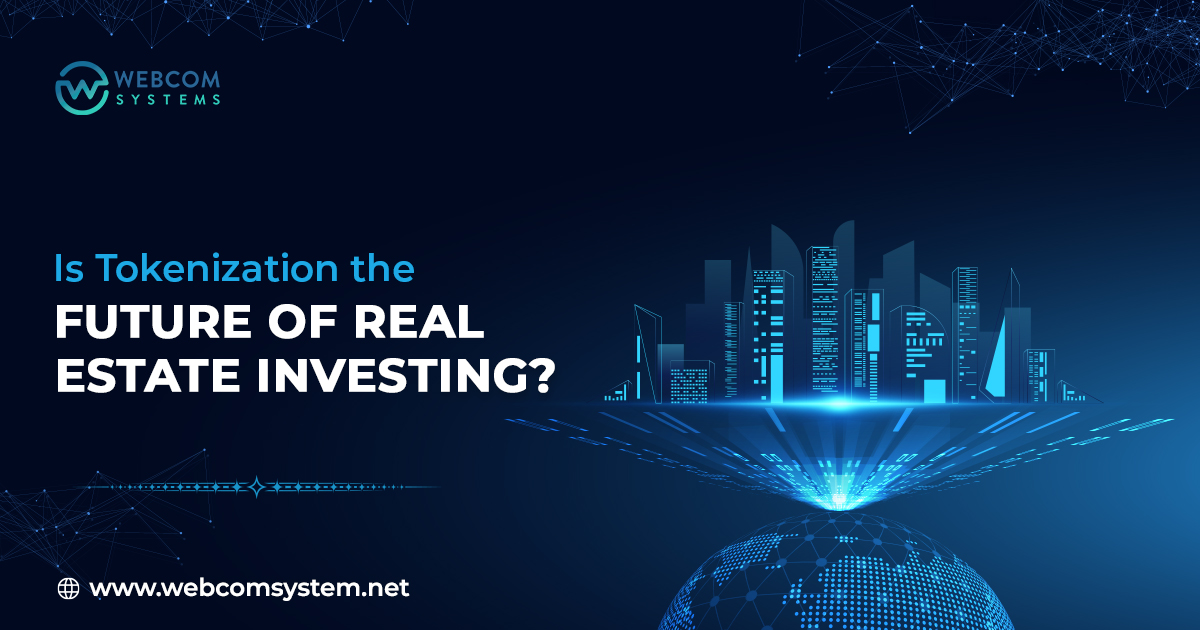Tokenization is a word that has changed the real estate investment industry forever. Tokenization occurs when a real-world asset like a house is converted into digital tokens stored in a safe and decentralized blockchain. Such tokens are the fraction ownership of the real estate, which makes real estate more available and liquid.
What is the probability of Tokenization becoming the main trend in real estate investments? This controversy, which has divided the industry, becomes a matter of discussion. The supporters of virtual currency make sure to state the possibility of higher accessibility, market liquidity, and transparency. Critics believe obvious issues, such as legal barriers and technological obstacles.
The purpose of this blog post is to give valuable insights into the case of Tokenization, to examine possible pros and challenges of real estate investment and to evaluate theoretically whether Tokenization is the key to future success in investing.
What is Tokenization, and How Does it Apply to Real Estate?
Tokenization means converting any real-world asset into its digital form which subsequently is kept as a digital record in a blockchain. In the real estate context, this means that the ownership of one property is broken down into smaller pieces, and each part is issued as a unique digital token. Tokens may be bought and sold on secondary markets in a way that is easier compared to cryptocurrencies or stock buying.
Here’s how it works:
- Property Selection & Securitization: A property is identified, and it is carefully evaluated from a legal and financial perspective. This provides investors with the confidence that everything is above board and thus helps them make an informed choice.
- Tokenization: Ownership of the property is divided into tokens which are digital, and for every token, it represents a fractional share.
- Issuance & Distribution: These tokens are created on a blockchain platform, and then these coins are available for investment through an Initial Coin Offering (ICO) or a secondary market.
The Potential Benefits of Tokenized Real Estate
Tokenization reveals a possible vision of the future when real estate investment becomes affordable, easy and globally interconnected. Let’s explore some key benefits that could transform the industry:
Democratization of Investment: Historically, income property acquisition has been limited to only the wealthiest investors. Tokenization bypasses those traditional rules by allowing for the distribution of funds. One property may be broken down into digital tokens, every token representing an asset, small yet equivalent to a portion of ownership. This gives the opportunity to the investors to invest in the market with small investment amounts, hence widening the market to reach more people.
Increased Liquidity: The biggest drawback to traditional real estate investment is its low liquidity. The sale of a property is as costly as it is time-consuming. This can limit the ability of investors to liquidate their investments quickly. Tokenization offers a solution. Since tokens are digital assets that are being traded on a blockchain platform, the buying and selling process is much faster and easier. This also fosters a more liquid market, which in turn gives investors more flexibility in buying and selling not only short but also longer-term positions.
Enhanced Transparency and Efficiency: Blockchain technology as the basis of Tokenization allows to ensure various financial operations in a safe and transparent mode. All the necessary data, from ownership history to maintenance records, can be immutably stored on the blockchain and shared with authorized parties. This degree of transparency provides a climate of trust as well as diminishes the need for intermediaries. By doing so, we simplify processes and reduce costs related to conventional real estate transactions.
Improved Fractionalization: The idea of Tokenization is much more than about cutting ownership apart. New technology enables even higher levels of detailing, which was unimaginable before. For example, tokens could denote not just a share of the whole property, but also particular income flows. Think of owning certificates that give you a right to a fraction of earned rental income from certain real property or certificates of the potential appreciation value. This level of fractionalization provides more choices to investors and gives them the possibility to craft their investment strategy to meet their particular targets.
Global Investment Opportunities: Investment in real estate is often restricted by geographic barriers. Tokenization removes these limitations. Through digitalizing the tangible investment areas, Tokenization shapes the circumstances where distant investors from any part of the world have a chance to engage markets that were previously out of reach for them. It creates possibilities of greater wages and better diversification for investors looking for broad markets because of the developments on a global scale.
While the benefits are quite convincing, it is also imperative to address the difficulties and the aspects involved.
Challenges and Considerations for Tokenized Real Estate
Tokenization can potentially be applied in real estate, but overcoming several challenges is necessary before fully realizing its potential. Here are some key considerations:
- Regulatory Uncertainty: The absence of regulations at the beginning of the tokenized real estate highlights the unclarity of the legal framework. A majority of governing entities still do not have a framework established for token issuance, trading, and investor protection. This unpredictability results in an arrangement that is similar to waiting and not allowing adoption by a wider circle. Regulatory clarity becomes the key factor to promote confidence along with market stability.
- Technological Challenges: Blockchain technology has awesome possibilities, but it has some obstacles as well. Scalability remains a concern. At present the existing platforms may find it to be rather difficult to deal with the high volume transaction in regard to a tokenized liquid real estate market. Security is another consideration. Many cyber criminals use numerous types of tools and methods to attack blockchain technologies. As a result, they make existing systems even more vulnerable. Therefore, cyberattacks are a constant threat. Technological improvements and regular software updates can avert this threat. Additionally, user-friendliness needs improvement. It is not easy for non-technical investors to deal with the intricate and delicate blockchain interfaces.
- Valuation and Risk Assessment: Prize evaluation of tokenized real estate assets poses a major difficulty. The old way of evaluating the assets, which involves comparable sales, might not work for this new entity. Also, investors should know the uncommon risks associated with tokenized investments. These may comprise smart contract vulnerabilities, and liquidity risks specific to the given platform, as well as the risks of the real estate asset on its own.
- Market Adoption and Trust: Building trust among investors and raising awareness on wider adoption should not be neglected. While tokenized real estate is a new concept, a number of investors still might not be aware or ready for such risks. Educational interventions, industry leaders and regulators are important in order to show the technology and convince people of its positive benefits.
- Legal and Compliance Issues: Compliance and legal matters become more complicated as a result of Tokenization. Clear laws must handle disputes on ownership, tax implications, and matters of conflict resolution across different jurisdictions. Collaboration between regulators, lawyers, and the real estate industry is critically crucial to creating legal ways for tokenized real estate asset ownership.
Potential Future Developments in Tokenized Real Estate
Regulation, Technology, and Market Adoption:
- Regulatory Evolution: Regulatory hurdles have slowed widespread adoption, but as frameworks evolve, Tokenization may become more secure and widely accepted.
- Technological Advancements: Blockchain technology and smart contracts enhance transparency, streamline transactions, and reduce costs in tokenized real estate.
- Market Growth: Predictions suggest a multi-trillion dollar market for tokenized assets by 2030, indicating growing recognition and adoption of Tokenization.
Hybrid Models and Impact on Real Estate Aspects:
- Hybrid Approaches: A possible application of hybrid models, which would be the combination of the traditional and the tokenized systems, might provide access to new ways of investing and, at the same time, improve market efficiency.
- Property Management: Tokenization can speed up the property management processes through smart contracts automation and real-time transaction monitoring.
- Financing: Tokenization is capable of innovating financing because it offers easier access to capital, reduces transaction costs and also allows fractional ownership.
The Future of Tokenization in Real Estate
The Future of the Tokenized Real Estate Market Depends on the Progression of Legislation, Technology, and Market Perception.
Regulatory bodies need to acquire knowledge in this area to establish rules that clarify the parameters of token issuing, trading, and investor protection. We should anticipate clearer laws that promote innovation and reduce risks as a result. This will have a positive effect on the marketplace reputation, leading to greater investor trust, and Hence, the deployment rate will increase.
Technologies will have a key role in the game of changing the present issues. Scalable and well-protected (by better security measures) platforms featuring customer customer-friendly interfaces are necessary. Besides that, it will be beneficial to have an integration of Tokenization with existing property management systems to make the process of running the business smoother.
Market adoption of a new solution is a mutual process. As rules and regulations set and technology improves, various investors are also likely to increase their desire to take part. Educational programs by sector leaders will additionally enhance the disclosure of the basics of Tokenization and trust among people. A mix of typical and tokenized models could be the next stage in the market with a focus on tokenized vehicles. To start, tokenizing a commercial property could enable greater investor participation while ensuring that core investors retain their traditional ownership.
Tokenization will create a financial revolution that will extend beyond investment to the purchase of goods and services. Streamlining transactions via blockchain could drastically change property management, automating rent payments and maintenance requests.
Tokenization is the thrilling change that emerges with the potential to lead to a complete change in property investment. While it is still far from a certainty, it offers very promising prospects for future development.
One of the most compelling aspects of Tokenization is its ability to democratize the market. By enabling fractional ownership through Tokenized Assets Platforms, Tokenization makes real estate accessible to a broader audience with lower capital requirements. This opens doors for investors seeking quicker entry and exit points, similar to the flexibility offered by real estate crowdfunding platforms.
Studies by Deloitte and Allied Market Research even predict a multi-trillion dollar global tokenized real estate market by 2030. However, challenges remain. Regulatory frameworks governing tokenized securities are still evolving, creating uncertainty for investors. Additionally, blockchain technology itself requires further development to ensure robust security and scalability.
The Bottom Line
Tokenization is a futuristic vision of how real estate investment is going to look like. It presents the opportunity for the exploration of provisions for more accessibility, liquidity, and transparency. But there are still regulatory roadblocks, technological problems, and market distrust remain.
In our view, although Tokenization may not fully replace the traditional real estate investment form, it still could be a good addition to those options. On the other hand, one can view it as a newcomer that may later establish itself as a standard, rather than replacing traditional models. We expect a hybrid investment environment to emerge in the future, where it will meet the demands of various investors and types of assets.
Being up to date with regulatory developments, technological developments, and case studies is very important to venture capital firms and all involved stakeholders. The market transformation will result in new entrances, thus necessitating informed decision-making. Webcom Systems is a key player in the realm of Tokenization, offering a robust platform for tokenized asset offerings. The company excels in various aspects of Tokenization, including reducing illiquidity discounts and enhancing compliance, ensuring automated compliance with blockchain and smart contracts through globalized KYC/AML verification, and creating customized, scalable blockchain and smart contracts for legally compliant tokens. Moreover, Webcom Systems enables global investor participation by facilitating token trading across borders with automated reporting to regulatory authorities and interoperability for exchanges worldwide.
Also Read: Blockchain in Identity Management for Businesses in 2024




